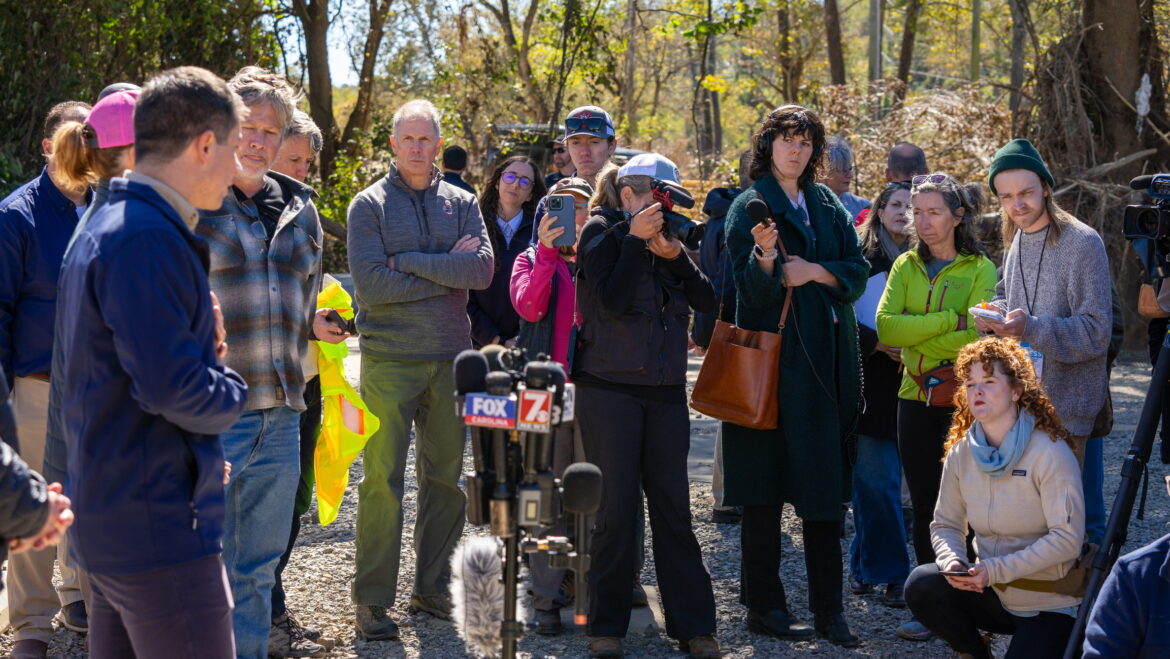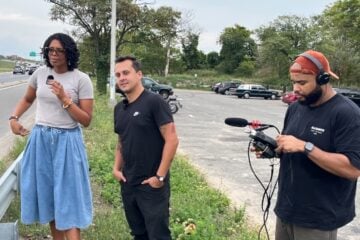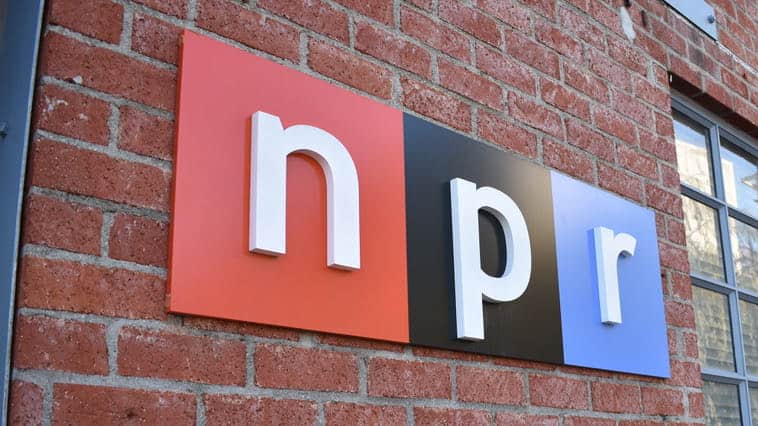BPR receives CPB grant to fund full-time reporter covering Hurricane Helene recovery

Gerard Albert III / BPR
Local government reporter Laura Hackett, fourth from right, records U.S. Transportation Secretary Pete Buttigieg as he speaks during a visit to Asheville, N.C. on Oct. 17, 2024.
Nearly nine months after Hurricane Helene trampled across western North Carolina and long after reporters from national outlets trickled in and out, Blue Ridge Public Radio now has a reporter dedicated to covering Helene recovery full-time.
BPR reporter Laura Hackett is taking on the role for the next 18 months after following recovery efforts alongside her local government beat since the storm. She told Current that her background covering local government will be especially helpful as she spends more time tracing how government funds are being used in recovery efforts.
Her reporting is funded by a $105,000 CPB grant. The money comes from CPB’s fiscal year 2025 funds and will therefore not be impacted if the Senate passes the House rescissions package that would claw back CPB funding for fiscal years 2026 and 2027, according to a CPB spokesperson.
Since BPR is using the funding to pay an existing employee’s salary instead of adding staff, the station won’t have to raise as much revenue next year, according to CEO Ele Ellis.
The grant follows an initial $47,500 CPB grant to BPR in October 2024. The station used that funding for engineering repairs, fuel for generators powering transmitters, help with payroll and accounting, and additional reporters and editors to assist news staff.
Deeper reporting on accountability

Hackett has worked for BPR since June 2023 and has lived in the area for over eight years. When the storm dumped up to 30 inches of rain and whipped 60-mile-an-hour winds across the region, Hackett was part of BPR’s team covering the devastation. Fifty-three days after the storm, she wrote the story announcing that Asheville finally had access to clean water again.
As many local residents’ only source of news in the immediate aftermath of the storm, BPR focused on broadcasting essential information and aired county governments’ daily briefings.
“That very specialized survivalist kind of information felt like something that really only a local outlet like us could deliver,” Hackett said. “… I think we brought an energy of understanding because we were living through the storm. We were able to understand what other people needed during the storm.”
The reporting differed from what national outlets focused on about the storm. Those stories highlighted the scope of destruction and the need in the area. Most residents likely couldn’t even access those national outlets’ stories, said Hackett.
The national focus on the area was short-lived, but recovery will continue for years. Hackett has since traced the storm’s web of impacts on the local economy, housing and water infrastructure while still reporting on county governments. She’s also working on a collaborative story with the Associated Press about the impact of natural disasters on education.
“When the water stops, that also stops industry, that stops tourism, that stops restaurants from being able to operate,” she said. “So from there, there’s been a lot of troubling economic downturn as a result of Hurricane Helene. So I’ve been following that. And with that economic downturning, there [are] housing crises, people unable to pay for their rents [and] also housing inventory being reduced.”
Hackett said she plans to continue reporting on how water infrastructure repairs are funded and carried out to help prevent a similar crisis. She also wants to do “deeper community reporting” and follow up on recovery efforts in communities outside of Asheville. That also includes reporting on “the next brewing crisis” from the hurricane: mental health.
“After our community endured so much trauma and loss last year, for some, it can take months — even years — for some of the reverberations of that to really surface in mental health,” she said.
Hackett said the new beat also gives her more time to do “deep accountability and investigative reporting” and to keep better track of federal, state and local funding for recovery efforts. That’s especially relevant as Trump administration cuts to federal agencies have built “a larger picture of a more challenging recovery.”
“I plan to serve as a watchdog for all of the federal and state money coming in to ensure that those funds are being spent with accountability and transparency,” she said.
With potential federal funding cuts looming, Hackett said BPR is a critical piece of the recovery.
”Public radio is a crucial tool in community recovery,” Hackett said. “We were there since the beginning of this storm, and we want to continue to be with our community throughout the entire recovery.”







